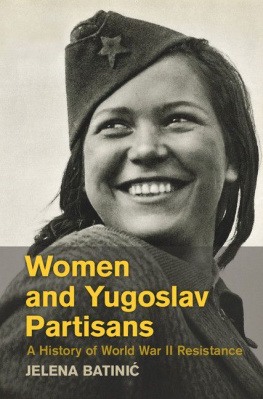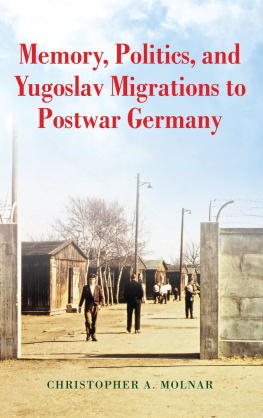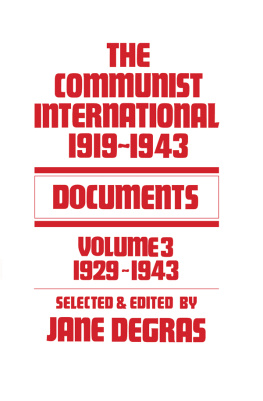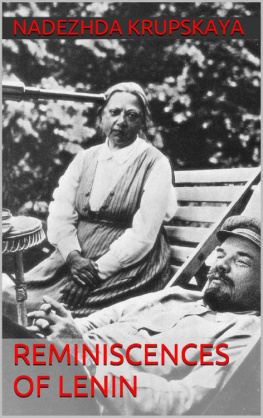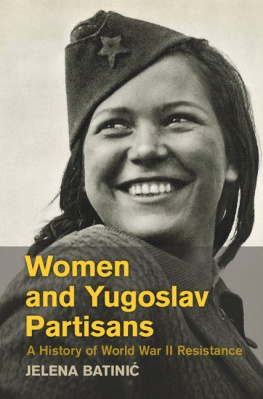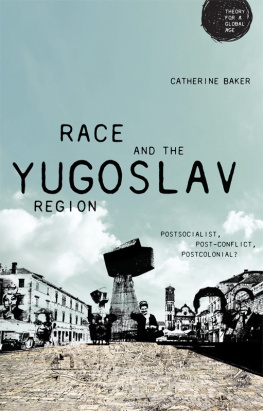This book focuses on one of the most remarkable phenomena of World War II: the mass participation of women, including numerous female combatants, in the communist-led Yugoslav Partisan resistance. Drawing on an array of sources archival documents of the Communist Party and Partisan army, wartime press, Partisan folklore, participant reminiscences, and Yugoslav literature and cinematography this study explores the history and postwar memory of the phenomenon. More broadly, it is concerned with changes in gender norms caused by the war, revolution, and establishment of the communist regime that claimed to have abolished inequality between the sexes. The first archive-based study on the subject, Women and Yugoslav Partisans uncovers a complex gender system in which revolutionary egalitarianism and peasant tradition interwove in unexpected ways.
Jelena Batini is currently a Fellow in the Thinking Matters Program at Stanford University. She is a historian specializing in modern Eastern Europe, World War II, and gender history. Her work has been published in edited volumes and journals including the Journal of International Women's Studies and Journal of Women's History . She has been a Mellon/ACLS Recent Doctoral Recipients Fellow and Postdoctoral Fellow in Stanford University's Introduction to the Humanities Program.

32 Avenue of the Americas, New York, NY 10013-2473, usa
Cambridge University Press is part of the University of Cambridge.
It furthers the University's mission by disseminating knowledge in the pursuit of education, learning, and research at the highest international levels of excellence.
www.cambridge.org
Information on this title: www.cambridge.org/9781107091078
Jelena Batini 2015
This publication is in copyright. Subject to statutory exception and to the provisions of relevant collective licensing agreements, no reproduction of any part may take place without the written permission of Cambridge University Press.
First published 2015
Printed in the United States of America
A catalog record for this publication is available from the British Library.
Library of Congress Cataloging in Publication Data
Batini, Jelena.
Women and Yugoslav partisans : a history of World War II resistance /
Jelena Batini (Stanford University).
pages cm
Includes bibliographical references and index.
ISBN 978-1-107-09107-8 (hardback)
1. World War, 19391945 Underground movements Yugoslavia.
2. World War, 19391945 Participation, Female. 3. Women guerrillas
Yugoslavia History. 4. Women soldiers Yugoslavia History. 5. World War,
19391945 Women Yugoslavia. 6. World War, 19391945 Social aspects
Yugoslavia. 7. Sex role Yugoslavia History. 8. Collective memory
Yugoslavia History. 9. War and society Yugoslavia History.
10. Yugoslavia Social conditions. I. Title.
D 802. Y 8 B 38 2015
940.53497082dc23 2015003331
ISBN 978-1-107-09107-8 Hardback
Cambridge University Press has no responsibility for the persistence or accuracy of URLs for external or third-party Internet Web sites referred to in this publication and does not guarantee that any content on such Web sites is, or will remain, accurate or appropriate.
Contents
Illustrations
Note on Translation
All translations from the South Slavic languages to English are mine unless otherwise indicated. In contrast to English, there are three grammatical genders in Bosnian/Croatian/Serbian. There are no satisfactory English equivalents for nouns that indicate a person's sex, such as partizan (Partisan, male) and partizanka (Partisan, female), or drug (comrade, male) and drugarica (comrade, female). I indicate a person's sex by adding woman/female or man/male to the noun, for example, Partisan women, male comrades, female fighters.
There are two terms, komitet and odbor, in Bosnian/Croatian/Serbian that correspond to the English word committee. In World War II, the term komitet(i) was reserved for party committees, while odbor(i) was used for organs of the Antifascist Front of Women (AFW) and the people's government. To mark the distinction, I have decided to keep the English committee when referring to komitet , and to use council for odbor . The following text thus mentions party committees, AFW councils, and national-liberation councils.
For translations of South Slavic national and geographic appellations, I have decided to adopt the system proposed by Ivo Banac.Croatian coast, Slovenian language. For nouns, I use Serb(s), Croat(s), and Slovene(s). Therefore, Croatian Serb refers to a person of Serb ethnonational extraction who lives in Croatia; Bosnian Croat refers to an ethnically Croat person who is from Bosnia, and so on.
Ivo Banac , The National Question in Yugoslavia: Origins, History, Politics ( Ithaca, NY : Cornell University Press , 1984 ), .
Acknowledgments
This study has its origins in a seminar paper I wrote as a student more than a decade ago. Over the years, as the paper evolved into a book manuscript, I have incurred many debts. I have had the great fortune of working with exceptional scholars at Stanford University. My deepest gratitude goes to Norman Naimark, who encouraged me to pursue this project and provided guidance along the way. An outstanding mentor and exemplary historian, he has played an invaluable role in my intellectual development. I have learned a great deal about gender and war in Eastern Europe from Katherine Jolluck. I thank her for her careful reading of multiple drafts and many insightful suggestions, which have significantly improved this study. James J. Sheehan inspired rigor in my analysis and gave me valuable advice on the manuscript.
My thanks are due to the two anonymous readers for Cambridge University Press for their excellent comments; they encouraged me to situate this study in a broader comparative context than I had originally intended. A supportive community of graduate students and colleagues at Stanford helped me refine my ideas at various stages of this project. Daniela Blei, Jovana Knezevic, Yair Mintzker, Julia Sarreal, and Kari Zimmerman read chapter drafts and I thank them for their suggestions. I am grateful for the encouragement and constructive feedback I received at this work's inception, at the Ohio State University, from Leila Rupp, Katherine David-Fox, Nicholas Breyfogle, and Dorothy Noyes.
The research for this project was carried out in several archives and libraries in the Balkans and the United States, and I owe special gratitude to their respective staffs. I spent many months in the Military Archive (formerly known as the Archive of the Institute of Military History), the Archive of Yugoslavia, and the National Library in Belgrade. This book would not have been possible without the assistance of the archivists and librarians who work there. The staff of the Museum of Yugoslav History helped me search through thousands of wartime photos. At Jugoslovenska Kinoteka I received assistance with illustrations and permissions; I remember Marijana Cukuan's kindness with particular gratitude. In the United States, I conducted research in the Hoover Institution Archives and enjoyed access to the vast resources of the Hoover and Stanford libraries.
For generously supporting the writing of this study I am indebted to the American Council of Learned Societies and the Andrew Mellon Foundation, as well as the Humanities Center and Michelle R. Clayman Institute for Gender Research at Stanford University. Research for this project was made possible by grants and fellowships I received from Stanford University's History Department; Center for Russian, East European, and Eurasian Studies; Freeman Spogli Institute for International Studies; School of Humanities and Sciences; Vice Provost for Graduate Education; and the Thinking Matters Program.

